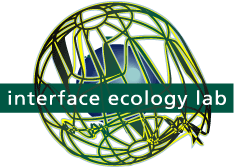
My research interest is in human-centered computing, specifically in bimanual interaction, information visualization,
interface design, computer vision for tracking movement, art (and the beautiful interchange
science and art can have), and wearable computing.
I am actively involved in the HCI research community. I have reviewed papers for ACM Conference on Human Factors in Computing Systems (CHI), Symposium on User Interface Software and Technology (UIST), Multimedia (MM), Joint Conference on Digital Libraries (JCDL), and Internation Conference on Intelligent User Interfaces (IUI). I have served on the program committee for Creativity and Cognition, CHI Works-in-Progress, and CHI Workshops. I have co-chaired two workshops on Evaluation Methods for Creativity Support Environments at CHI 2013 and Design Computing and Cognition 2012.
My dissertation research developed Emmâ, short for Embodied IdeaMÂCHÉ, a creativity support environment that enables visual designers to work directly with their hands, through pen and multi-touch interaction, to collect and organize information and sketch and annotate admist the freefrom, non-linear medium of information composition. My Master's thesis developed an new fluid, transitory interface component, the In-Context Slider, for visualization and adjustment of a value near a participant's point of focus. combinFormation uses the In-Context Slider as an interface for the human participant to express interest (provide feedback on relevance) on elements within a mixed-initiative composition to help direct the agents.
Being a member of the Interface Ecology Lab, I've had the opportunity to mix artistic avocations with systematic science, to design interfaces for the playful and the efficient, to explore ideas of embodied interactions that promote social invitation, and to bridge disciplinary domains improving research and understanding. In doing so, I've collected not only a better awareness of my own research but also an inflection to my creative process - a bend in my design methodology. A bend away from creating just the beautiful and practical towards designing for the experiential, the expressive, the embodied.
publications, presentations, exhibitions
















http://doi.acm.org/10.1145/1416950.1416955.


Proc Joint ACM/IEEE Conf. on Digital Libraries (JCDL), June 2006, Chapel Hill.

 acm.org
acm.org